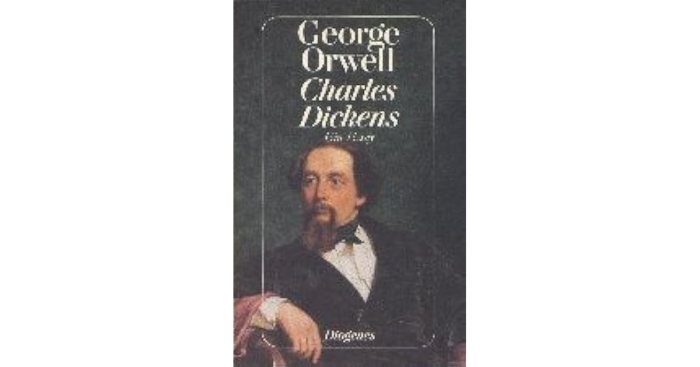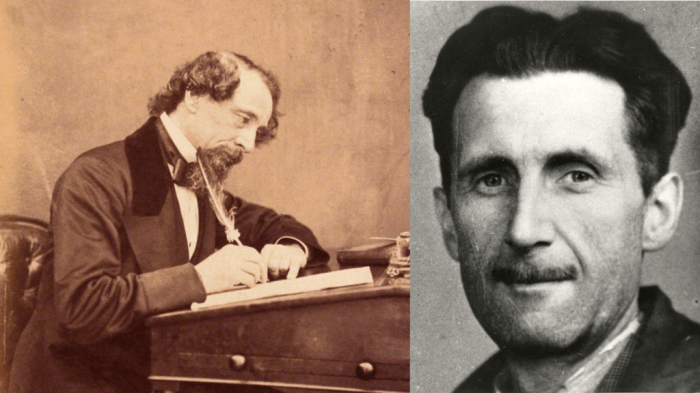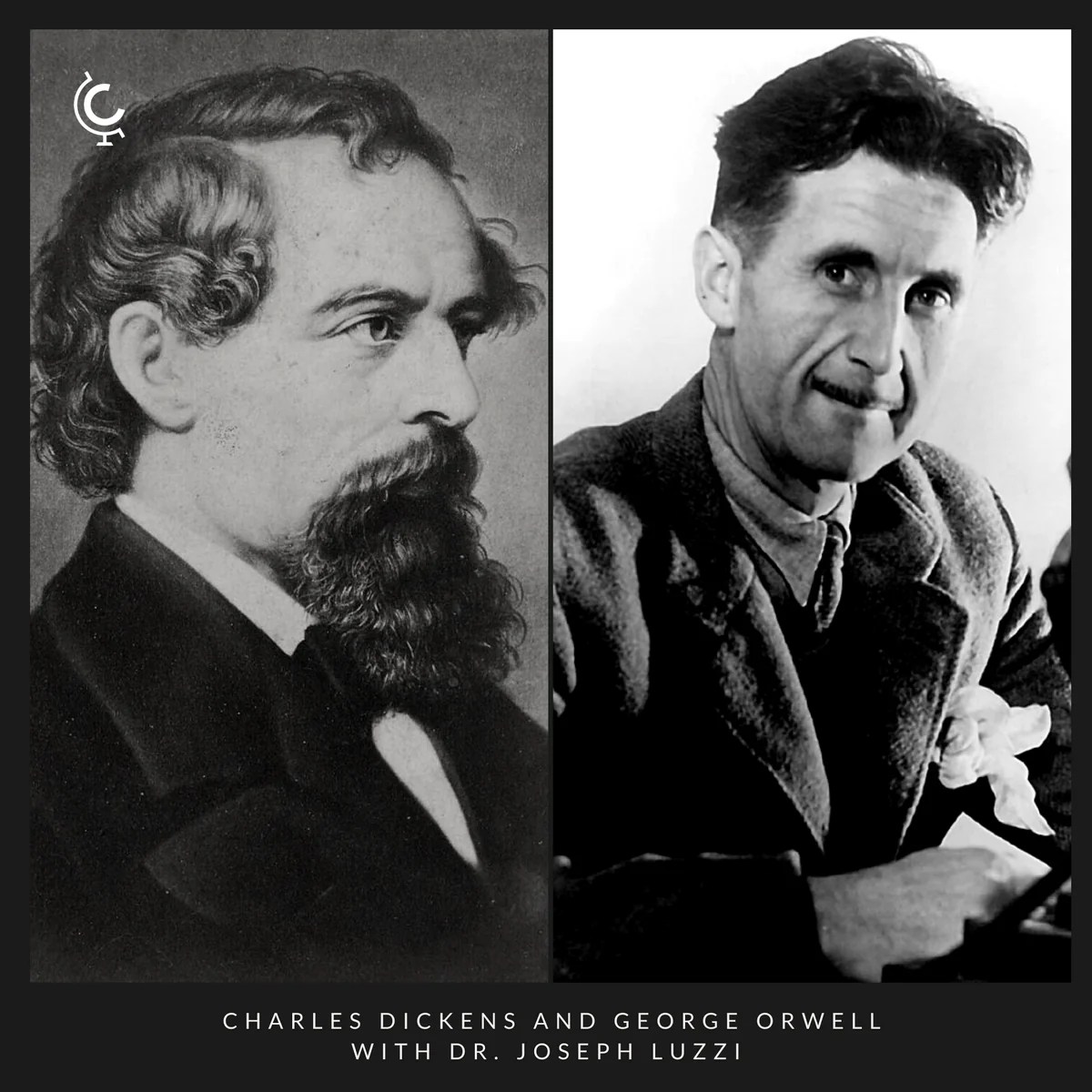Suffix with dickens or orwell – With Dickens and Orwell’s influence looming large in literary circles, we embark on an enthralling journey to explore their masterful use of literary techniques and the profound social and political themes they delved into.
Their novels, like intricate tapestries, showcase a kaleidoscope of characters, symbols, and historical contexts, inviting us to unravel the complexities of their craft and the enduring legacy they left behind.
Literary Techniques in Dickens and Orwell’s Works
Charles Dickens and George Orwell are two of the most renowned authors in English literature, known for their distinct literary styles and the impact they have had on society. Both writers employed a range of literary techniques to convey their messages and create vivid and memorable characters.
One of the most striking similarities between Dickens and Orwell’s works is their use of satire. Dickens’s novels are often characterized by their biting social commentary, which he used to expose the hypocrisy and inequality of Victorian society. Orwell, too, used satire to criticize the totalitarian regimes of his time, particularly in his dystopian novel 1984.
Realism
Another common literary technique used by both Dickens and Orwell is realism. Their novels are filled with detailed descriptions of everyday life, and their characters are often drawn from real-life observations. This realism helps to create a sense of authenticity and immediacy, and it allows readers to connect with the characters on a personal level.
Symbolism
Dickens and Orwell also made extensive use of symbolism in their works. Dickens’s novels are full of symbols that represent different aspects of society, such as the fog in Bleak House, which represents the moral and social decay of London. Orwell, too, used symbols to convey his political messages, such as the Big Brother figure in 1984, which represents the oppressive power of the state.
In conclusion, Dickens and Orwell were both masters of literary technique. Their use of satire, realism, and symbolism allowed them to create vivid and memorable characters, and to convey their messages in a powerful and effective way.
Social and Political Themes: Suffix With Dickens Or Orwell

Charles Dickens and George Orwell were two of the most influential writers of the 19th and 20th centuries, respectively. Their novels often explored social and political issues, critiquing the societal norms, class inequality, and political oppression of their time.
Critique of Societal Norms
Both Dickens and Orwell criticized the rigid societal norms of their time. Dickens’s novels often depicted the plight of the poor and marginalized, while Orwell’s works explored the dangers of totalitarianism and the suppression of individuality.
In Oliver Twist, Dickens portrays the harsh treatment of orphans in workhouses, highlighting the hypocrisy of a society that claims to value compassion and charity. Orwell’s Nineteen Eighty-Fourdepicts a dystopian society where the government controls every aspect of citizens’ lives, suppressing dissent and individuality.
Class Inequality
Dickens and Orwell also criticized the class inequality that characterized their societies. Dickens’s novels often featured characters from different social classes, highlighting the vast gulf between the wealthy and the poor. Orwell’s works explored the ways in which class divisions can be exploited by those in power.
In Great Expectations, Dickens tells the story of Pip, a young orphan who is raised by a wealthy woman. Pip’s experiences highlight the challenges faced by those who try to rise above their social class.
Political Oppression
Orwell’s novels often explored the dangers of political oppression. Animal Farmis a satirical allegory that criticizes the Soviet Union’s totalitarian regime. Nineteen Eighty-Fourdepicts a dystopian society where the government uses surveillance, propaganda, and violence to maintain control.
Through their novels, Dickens and Orwell exposed the social and political injustices of their time. Their works continue to resonate with readers today, reminding us of the importance of fighting for justice and equality.
While suffixes play a significant role in the works of literary giants like Dickens and Orwell, they also find relevance in the legal realm. Take the case of Beeck v. Aquaslide N Dive Corp. , where the addition of the suffix “-ing” to a crucial verb transformed the meaning of a contract, highlighting the power of suffixes to shape both literature and legal proceedings.
Characterization and Symbolism

In the literary works of Charles Dickens and George Orwell, characterization and symbolism play significant roles in shaping narratives, developing themes, and creating memorable characters. Dickens’s characters often embody archetypes and social groups, while Orwell’s characters frequently serve as mouthpieces for political ideas.
Symbolism, in both authors’ works, adds depth and complexity to characters and themes.
Characterization Techniques
Dickens and Orwell employed distinct characterization techniques to portray their characters. Dickens’s characters often exhibit exaggerated traits and distinct physical features, making them instantly recognizable and memorable. He often created archetypal characters, such as the innocent orphan, the benevolent benefactor, and the scheming villain.
These archetypes allowed Dickens to explore universal human experiences and social issues. In contrast, Orwell’s characters are often more nuanced and realistic, representing different social and political viewpoints. He used characterization to explore the complexities of human nature and the effects of totalitarian systems.
Symbolism
Symbolism plays a vital role in both Dickens’s and Orwell’s novels. Dickens often used objects, places, and characters to symbolize abstract ideas and emotions. For example, the fog in Bleak Houserepresents the moral and social decay of Victorian London. In Orwell’s Animal Farm, the windmill symbolizes the hopes and aspirations of the animals, while the pigs represent the corrupting influence of power.
Symbolism in these works enhances the depth of characters, enriches themes, and creates lasting impressions on readers.
Historical and Cultural Context

Charles Dickens and George Orwell lived in different eras, each marked by significant historical and cultural shifts. Dickens’s works were shaped by the Industrial Revolution and Victorian society, while Orwell’s writing was influenced by the aftermath of World War II and the rise of totalitarianism.
The Industrial Revolution and Victorian Society
The Industrial Revolution brought about rapid urbanization, social upheaval, and economic inequality. Dickens witnessed firsthand the harsh conditions faced by the working class and the rise of a wealthy elite. His novels reflect the social problems and injustices of the time, exposing the plight of the poor and criticizing the hypocrisy of the upper classes.
Post-World War II Society, Suffix with dickens or orwell
Orwell’s experiences in the Spanish Civil War and World War II shaped his perspective on totalitarianism and the dangers of unchecked power. The rise of Nazi Germany and the Soviet Union prompted him to write dystopian novels that warned against the dangers of authoritarian regimes.
Comparative Analysis of Styles

Charles Dickens and George Orwell are two of the most celebrated English writers of the 19th and 20th centuries, respectively. Their works are known for their vivid characters, social commentary, and distinct writing styles.
Dickens’ writing style is characterized by its exuberance, humor, and sentimentality. He often uses long, flowing sentences filled with colorful descriptions and vivid imagery. His works are often full of larger-than-life characters and dramatic plot twists.
Orwell’s Style
Orwell’s writing style, on the other hand, is more direct and straightforward. He uses clear, concise language and avoids unnecessary embellishments. His works are often characterized by their political and social commentary, and he often uses satire and allegory to make his points.
Despite their different styles, Dickens and Orwell share some common ground. Both writers were masters of characterization, and their works are filled with memorable and complex characters. Both writers were also deeply concerned with social issues, and their works often reflect the social and political conditions of their time.
FAQ Insights
How did Dickens and Orwell’s backgrounds influence their writing?
Their experiences with poverty, social injustice, and political turmoil shaped their perspectives and fueled their passion for social commentary.
What are the key differences between Dickens’ and Orwell’s writing styles?
Dickens employed a more sentimental and descriptive style, while Orwell’s prose was concise, analytical, and often satirical.
How did Dickens and Orwell use symbolism in their works?
They employed symbols to represent complex ideas, social structures, and the human condition.